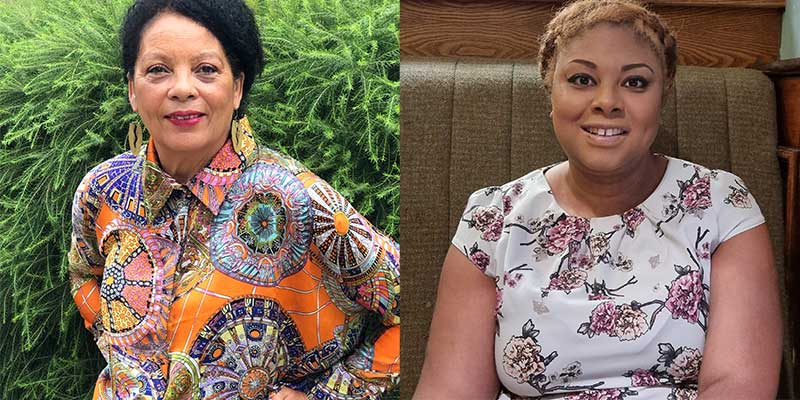Bringing diversity to the Welsh curriculum 21.09.22

Wales is now the first nation in the UK to include ethnic minority histories in its school curriculum. Can this initiative address the problem of racism in Welsh schools? Rohini Singh interviews Charlotte Williams and Natalie Jones to gain further insights into the extent to which this development could be transformative for creating an anti-racist society.
Features by masters students from the School of Journalism, Media and Culture (JOMEC) at Cardiff University, commissioned and published as part of our sponsorship partnership with JOMEC.


Left: Charlotte Williams. Image courtesy Charlotte Williams. Right: Natalie Jones. Image © Rohini Singh.
As the only Black child in her school in Wales, Charlotte William’s experience of education was vastly different from that of her White peers. Her textbooks had no inspiring stories of people like her.
‘I can’t remember a curriculum that gave me any sense of who I was or represented me in any way,’ says Charlotte.
It was not something she realised as a child but as she grew up, she began to understand the damage that a Eurocentric and White-biased education system had done to her confidence and self-esteem as a Black person.
‘If you’ve got something to say and no one is interested in it then it damages your confidence terribly,’ says Charlotte. ‘And it stays with you lifelong because you think that other people’s voices are more important than yours.’
According to her, a culturally homogenous curriculum is not only disadvantageous to children from ethnic minorities but also the majority because it takes away the opportunity to learn about the diversity of human experience.
‘They don’t get exposed to the different ways of thinking, knowing, being, doing. It doesn’t allow them to really expand their thinking.’
But the Welsh curriculum is set for a fundamental overhaul. Starting in September 2022, Welsh history is being taught ‘in all its diversity and complexity’ as a Welsh Government progress report put it, to encourage and foster understanding of Wales’ rich and varied heritage.
While the issue of a racially biased curriculum is a challenge throughout the four nations in the UK, Wales has been the first country in the UK to take a decisive step in this direction. In 2020, Charlotte led the working group to improve teaching on Black, Asian and ethnic minority communities and develop teaching resources and training programmes.
While she considers her work on the project extremely rewarding, she was surprised to find the inequalities in the field of education in Wales. The group found that the profile of the education workforce in Wales is shockingly skewed towards White teachers.
‘By and large, you will have your entire education in Wales today, in the twenty-first century, without the benefit of having a teacher from a minority background,’ says Charlotte.
Another finding that saddened her was the amount of evidence that she heard about racism in schools. Despite efforts being made to stop racial abuse from happening, a recent report by Race Equality First, an equality charity in the UK, stated that there has been a steady rise in reported cases of racism in Welsh schools.
Natalie Jones, a Welsh school teacher and volunteer at Race Council Cymru has seen this first hand with her ethnic minority students. She recently conducted an exercise where she asked the students to share their experiences if they have ever been discriminated against. The responses left her heartbroken.
A half-Chinese girl was told that Covid-19 was her and her community’s fault. A Black boy wrote in his form that children don’t believe that he has a father because of the belief that Black boys never have a father.
‘I have children as young as seven telling me they have been racially abused,’ says Natalie.
But as a teacher, she feels certain that the introduction of an inclusive and racially diverse curriculum in Wales can help change attitudes and perceptions. ‘I do think kids growing up need to see that their lives are better in certain ways because there are people who have immigrated and sought asylum in this country.’
She also stresses the need for the curriculum to teach Britain’s colonial past to students to foster a wider understanding of history and racism. She takes the example of Germany including the Nazi era and the Holocaust in its curriculum and interrogating its history despite the discomfort that comes with it.
‘You cannot just talk about some things and omit other things because they are not comfortable,’ says Natalie.
Charlotte says that a more representative and diverse curriculum can lead to more inclusive attitudes and values. ‘It will certainly be more empowering for all if we have a curriculum that truly and substantively reflects these perspectives.’
While changes in the curriculum hold the promise of bettering the education system in Wales, several challenges will need to be addressed once the plan comes to action. One of the issues Charlotte brings up is that in places where there is a low ethnic minority presence, this may be wrongly correlated with the amount of effort needed to make the modules inclusive.
‘It could well be that they need to be doing more in these areas,’ says Charlotte.
Other concerns she expresses are the capacity of the teachers to adapt to the new curriculum and the model that schools may adopt for rolling out the mandate. ‘Is it going to be an add-on “day on diversity” kind of thing or is it going to be something much more transformative where they look at everything they do?’
But according to Charlotte, education alone cannot change society. The Welsh Government has launched an ‘Anti-Racist Wales Action Plan’ to look into ways that racism is built into policies, rules and regulations in all areas including health, employment, housing, etc. The initiative to make education more representative in Wales is embedded in its larger vision to end racism in the country.
‘Schools alone can’t put to right racism in society,’ she says. ‘It has to be a much broader and more strategic approach and we hope we have got that in the new plan.’

About the author
Rohini Singh is a freelance journalist passionate about issues related to social justice, environment and international relations.
Twitter- @rohini2589
Further articles from Planet Platform:
Faith Clarke
‘I’m not lazy like those people’: How austerity rations our compassion
Elizabeth Facer
Reflections from the Wales Coast Path: Penrhyndeudraeth to Harlech
Laura Stevens
Dock to Dock: The Cardiff Bay Barrage
Natalie Cox
Retracing Wales | Discover the Shape of a Nation